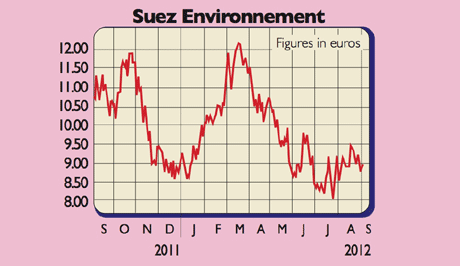Get the latest financial news, insights and expert analysis from our award-winning MoneyWeek team, to help you understand what really matters when it comes to your finances.
You are now subscribed
Your newsletter sign-up was successful
Want to add more newsletters?

Twice daily
MoneyWeek
Get the latest financial news, insights and expert analysis from our award-winning MoneyWeek team, to help you understand what really matters when it comes to your finances.

Four times a week
Look After My Bills
Sign up to our free money-saving newsletter, filled with the latest news and expert advice to help you find the best tips and deals for managing your bills. Start saving today!
This year we've had a spring hosepipe ban followed by a summer deluge. These kinds of weather extremes underline the importance of the role of water companies in collecting, treating and distributing the world's most valuable resource. The good news for investors is that firms such as Suez Environnement Europe's second-biggest water (53% of sales) and waste (43%) utility produce predictable returns and strong dividends.
The firm's business spans the globe, but 70% of it is in Europe, where the debt crisis has triggered falling water prices in France. These come on top of lower recycling rates and reduced waste output in countries such as Britain and Holland, especially from the construction sector and the car industry (Suez has a partnership with Renault to recycle waste from cars it produces).
As a result, in the last interim results, earnings before interest, tax, depreciation and amortisation (EBITDA) fell 8% to €1.13bn on flat revenues of €7.32bn. Profits were also hit by a one-off €52m charge related to the development of a new desalination plant in Melbourne, Australia.
MoneyWeek
Subscribe to MoneyWeek today and get your first six magazine issues absolutely FREE

Sign up to Money Morning
Don't miss the latest investment and personal finances news, market analysis, plus money-saving tips with our free twice-daily newsletter
Don't miss the latest investment and personal finances news, market analysis, plus money-saving tips with our free twice-daily newsletter
The chief executive, Jean-Louis Chaussade, didn't comment on the outlook for 2013, but did say that the outlook for June was better following a difficult few months. The desalination plant is now 95% complete and should be at full capacity by December.
Thankfully, the eurozone crisis is having "little impact" on the Spanish business, where water networks "need lots of work" and water rates are expected to rise more than the European average under decades-long agreements. Suez is also ratcheting up its cost-cutting efforts by €40m this year to €150m, along with trimming capital expenditure by €100m to €1.2bn.
Suez Environnement (PA: SEV), rated a BUY by AlphaValue

A proposed €0.65 dividend suggests a 7% yield for 2012. Net borrowings are a bit stretched at the end of June they reached €7.9bn (equivalent to a debt/EBITDA ratio of 3.26). This should be manageable, given the average maturity of the loans is seven years, with a combined interest rate of 5.25%, of which 78% is fixed.
Analysts are expecting 2012 turnover and EBITDA of €15.2bn and €2.2bn respectively, rising to €15.5bn and €2.3bn in 2013. On this basis I'd rate the group on a 7.5 times EBITDA multiple. Adjusting for the debt and another €2.3bn of liabilities, such as pensions, I get an intrinsic worth of €12.20 per share.
There are a few risks, such as further GDP declines in its key markets: France, Britain, Spain and Benelux. Others include greater competition, foreign-currency movements and difficulties achieving its restructuring targets. Nonetheless, Suez's core focus in developed markets, combined with its good earnings visibility and cash flow, offers investors some strong defensive characteristics.
Broker AlphaValue has a price target of €13.90, and third-quarter results are out on 25 October.
Rating: BUY at €8.90
Paul Hill also writes a weekly share-tipping newsletter, Precision Guided Investments. See www.moneyweek.com/PGI, or phone 020-7633 3634 for more information.
Get the latest financial news, insights and expert analysis from our award-winning MoneyWeek team, to help you understand what really matters when it comes to your finances.
Paul gained a degree in electrical engineering and went on to qualify as a chartered management accountant. He has extensive corporate finance and investment experience and is a member of the Securities Institute.
Over the past 16 years Paul has held top-level financial management and M&A roles for blue-chip companies such as O2, GKN and Unilever. He is now director of his own capital investment and consultancy firm, PMH Capital Limited.
Paul is an expert at analysing companies in new, fast-growing markets, and is an extremely shrewd stock-picker.
-
 Early signs of the AI apocalypse?
Early signs of the AI apocalypse?Uncertainty is rife as investors question what the impact of AI will be.
-
 Reach for the stars to boost Britain's space industry
Reach for the stars to boost Britain's space industryopinion We can’t afford to neglect Britain's space industry. Unfortunately, the government is taking completely the wrong approach, says Matthew Lynn